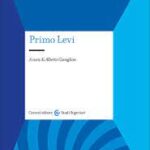BOOKS – Primo Levi, a new collection of essays by Cavaglion
 “It has been quite a task, and I’m really happy. I am also grateful to the publisher Carocci: it wanted this volume for the ‘Studi Superiori’ series, that now also includes my Primo Levi, the only author of the twentieth century. The volume consists of 23 essays by different authors and on very different topics, with some fairly dense texts. It was not easy to limit it to 500 pages, but thanks to a patient and very collaborative editor, I was able to include a little bit of everything.” Alberto Cavaglion’s satisfaction is evident, as is the richness of a volume that has just arrived in bookstores, leading the way to a possible synthesis of what has been done and what remains to be explored.
“It has been quite a task, and I’m really happy. I am also grateful to the publisher Carocci: it wanted this volume for the ‘Studi Superiori’ series, that now also includes my Primo Levi, the only author of the twentieth century. The volume consists of 23 essays by different authors and on very different topics, with some fairly dense texts. It was not easy to limit it to 500 pages, but thanks to a patient and very collaborative editor, I was able to include a little bit of everything.” Alberto Cavaglion’s satisfaction is evident, as is the richness of a volume that has just arrived in bookstores, leading the way to a possible synthesis of what has been done and what remains to be explored.
“Rabbi Riccardo Di Segni has drawn a balanced picture of what has been said over the years, sometimes superficially, on the label of ‘Jewish writer’, often hurriedly attached to Levi, and added some important clarifications”, he explained. “Then there is the contribution of Mauro Bignamini, with his reading of The periodic table, and an original thesis by Paola Valabrega dedicated to the identity of ‘survivor’: neither a witness nor a writer, dealing with the idea of the persistent burden of having taken the place of someone who did not survive.”
Among the other authors, Fabrizio Franceschini wrote on languages, codes and translations; Piero Bianucci on Natural Histories: very different methods and points of view that make up a sort of photograph of the many current readings and interpretations on Levi, an attempt to paint an accurate picture of the state of the art. And then Robert Gordon, ‘il maestro’, as Cavaglion calls him.
“The text on Dante by Lorenzo Bastida, a disciple of Sermonti, is completely novel – the author continued – and I think it is an essential reading. On the other hand, in my essay, which closes the volume, I got something off my chest: I made a brief history of the first reviews, to whom they were entrusted, and how they proceeded then to give Levi little credit, except when everyone went to interview him about the Middle East. The turning point came in 1987, but I tried to describe that ‘still state’ in which he found himself for so much of his life. I have been wanting to work on it for a long time, so as not to simply write more pages on If this is a man.”
Translated by Annadora Zuanel, revised by Martina Bandini, students at the Secondary School of Modern Languages for Interpreters and Translators of the University of Trieste, interns at the newspaper office of the Union of the Italian Jewish Communities – Pagine Ebraiche.
